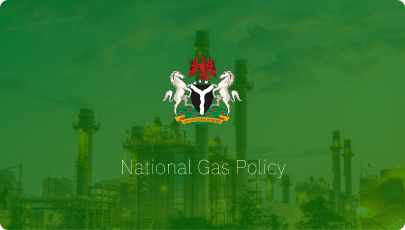Policies
The Ministry of Petroleum Resources, Nigeria has embarked on several public policy initiatives aimed at reforming and enhancing the petroleum sector. Some of these key initiatives include:
Associated Gas Re-Injection Act
This 1979 legislation required all oil companies to submit detailed plans for gas utilization or re-injection, rather than flaring. All company producing oil and gas in Nigeria were mandated to submit a preliminary programme for gas re-injection and a detailed plans for implementation of gas re-injection to the Minister of Petroleum Resources.
The legislation mandated companies to invest in facilities that gather, process, and utilize associated gas from oil production; and provisioned that there must be no flaring of gas produced in association with oil may be done without the permission in writing of the Minister.
Gas Master Plan
Launched in 2008, the Gas Master Plan is designed to harness Nigeria’s vast natural gas resources. It includes initiatives to develop infrastructure for gas processing, transportation, and utilization, with the goal of increasing domestic gas consumption, especially for power generation and industrial use.
Deep Offshore and Inland Basin
Petroleum Industry Act (PIA)
The PIB, proposed initially in 2008, aimed to overhaul the Nigerian oil and gas industry by creating a more transparent and efficient regulatory framework. After numerous revisions and delays, the PIB was finally passed into law as the Petroleum Industry Act (PIA) in August 2021.
The PIA seeks to promote investment, improve governance, and provide better revenue management in the sector. The PIA includes provisions for tax breaks, reduced royalties, and other fiscal incentives for investments in gas infrastructure and utilization projects. This aims to make such investments more attractive to oil companies.
Furthermore, the PIA provides a more transparent and stable regulatory environment, reducing uncertainty for investors and encouraging long-term investments in gas capture and utilization technologies.
The Promotion of Modular Refineries Development
To reduce dependency on imported refined products and improve local refining capacity, the Ministry of Petroleum Resources has promoted the development of modular refineries.
This initiative aims to encourage private investment in small-scale refineries that can be built more quickly and cost-effectively.
Gas Flaring (Prohibition and Punishment) Act
The Gas Flaring Prohibition and Punishment Bill, 2016, set the ultimatum for gas flaring to December 2016. Several deadlines with meagre sanctions were fixed by the Federal Government.
This act mandates that gas flaring be banned except under specific conditions approved by the Minister of Petroleum Resources.
Enabling Nigerian National Petroleum Corporation Reforms
The Ministry of Petroleum Resources has initiated several reforms to improve the efficiency and transparency of the NNPC.
This includes efforts to commercialize and restructure the corporation, with the aim of making it more competitive and financially viable.
Local Content Development Act
The Nigerian Oil and Gas Industry Content Development (NOGICD) Act of 2010 was introduced to increase indigenous participation in the oil and gas industry.
The Act mandates the use of local services and labor in oil and gas projects to boost local capacity and create jobs.
Zero Routine Flaring by 2030 Initiative
Nigeria is a signatory to the World Bank’s “Zero Routine Flaring by 2030” initiative.
This commitment involves eliminating routine gas flaring by 2030, with the government and oil companies collaborating to implement measures and technologies that reduce flaring and enhance gas utilization.
The promotion of Gas Utilization Projects
The Ministry of Petroleum Resources has promoted various gas utilization projects, such as gas-to-power, gas-to-liquids, and gas-to-chemicals initiatives.
These projects aim to create market demand for natural gas, making it economically viable to capture and utilize gas that would otherwise be flared.
Promotion of Marginal Fields Licensing Rounds
The government has periodically held licensing rounds for marginal fields, aimed at increasing the participation of indigenous companies in the oil and gas sector.
These rounds are designed to make smaller, less economically viable fields available to local operators.
Gas Flare Commercialization Program (NGFCP)
Launched in 2016, the NGFCP aims to monetize flared gas by providing incentives for private sector investment in gas flare capture and utilization projects.
The program seeks to convert flared gas into valuable resources such as electricity, compressed natural gas (CNG), liquefied natural gas (LNG), and other petrochemical products.
The National Gas Expansion Programme (NGEP)
Launched in 2020, the NGEP aims to increase the use of natural gas in Nigeria’s energy mix.
It promotes the adoption of Compressed Natural Gas (CNG) and Liquefied Natural Gas (LNG) as alternative fuels for vehicles and industries, enhancing energy security and reducing emissions.
Support for Enhanced Data Collection and Monitoring
The Ministry of Petroleum Resources is promoting mechanisms for improved accurate data collection and monitoring of gas flaring activities.
This involves the use of advanced technologies and collaboration with international agencies to ensure transparency and accountability in reporting flaring volumes.
Our Key Policies and Initiatives
Petroleum Industry Act

National Gas Policy

National Petroleum Policy

